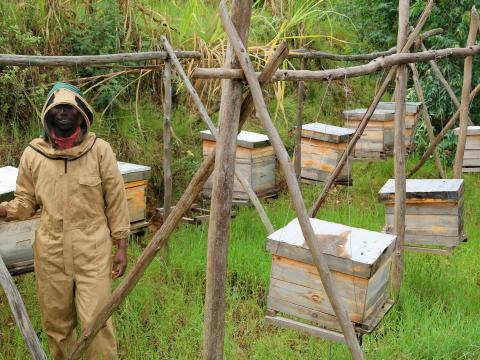From Honey to Money: how Beekeeping Business brought Economic Development

After attending training and receiving materials from World Vision (WV), 31-year-old Olivier has become one of the most experienced and modern beekeepers in Rushaki, Gicumbi district in Northern Rwanda.
Beekeeping is an ideal home-based and low-capital business for rural entrepreneurs. On both the national and international markets, the Rwandan honey is in high demand due to its diverse use. It is in this perspective that the Ministry for agriculture has called on beekeepers to increase the quantity and quality of their honey production in a bid to satisfy the increasing demand.
Olivier’s interest in beekeeping was triggered by an older beekeeper who approached him to make beehives and gave him practical knowledge about the subject. He had just completed secondary school and needed a job. Although he was passionate about his new activity, he realized that beekeeping did not make enough return. “In the first seasons, I collected 20kg of honey worth 16,000RwF (20 USD), with all the efforts I had put in that activity I felt that I was not gaining enough money,” he recalls.
In 2016, Olivier and other 21 beekeepers from Rushaki formed the cooperative Impashyi. WV supported the cooperative with training in modern beekeeping techniques and provided beekeeping equipment/kits (bee boxes, protective suits etc). More importantly, WV in partnership with Agri Technology Innovation and Consultance (ATIC), trained the cooperative on the processing of honey and its derivative products (bee wax) to get body lotions, shoes polish, candles. “By partnering with WV, our objective was to see beekeepers producing more from honey. Not just honey but also other products,” says Celestin Musoni, Director of Beekeeping promotion at ATIC.
Results were noticed right after the training and provision of materials. Through modern beekeeping, Olivier saw his production of honey increasing from 20kg per season to 90 kg. His income increased up to 70,000 RwF (85 USD) per season. “With that money, I was able to construct my house, install electricity and get married. I also bought a cow,” says the now father of a little girl.
With the skills acquired, cooperative Impashyi is now keen to produce first-quality honey in the country. They are already selling the honey in addition to other products like body lotions, candles and honey wines. The cooperative has also planned to train other beekeepers in order to promote modern beekeeping and increase productivity.
Through WV interventions, 57.2% of households in the former Rushaki AP are now earning income from different off-farm activities.